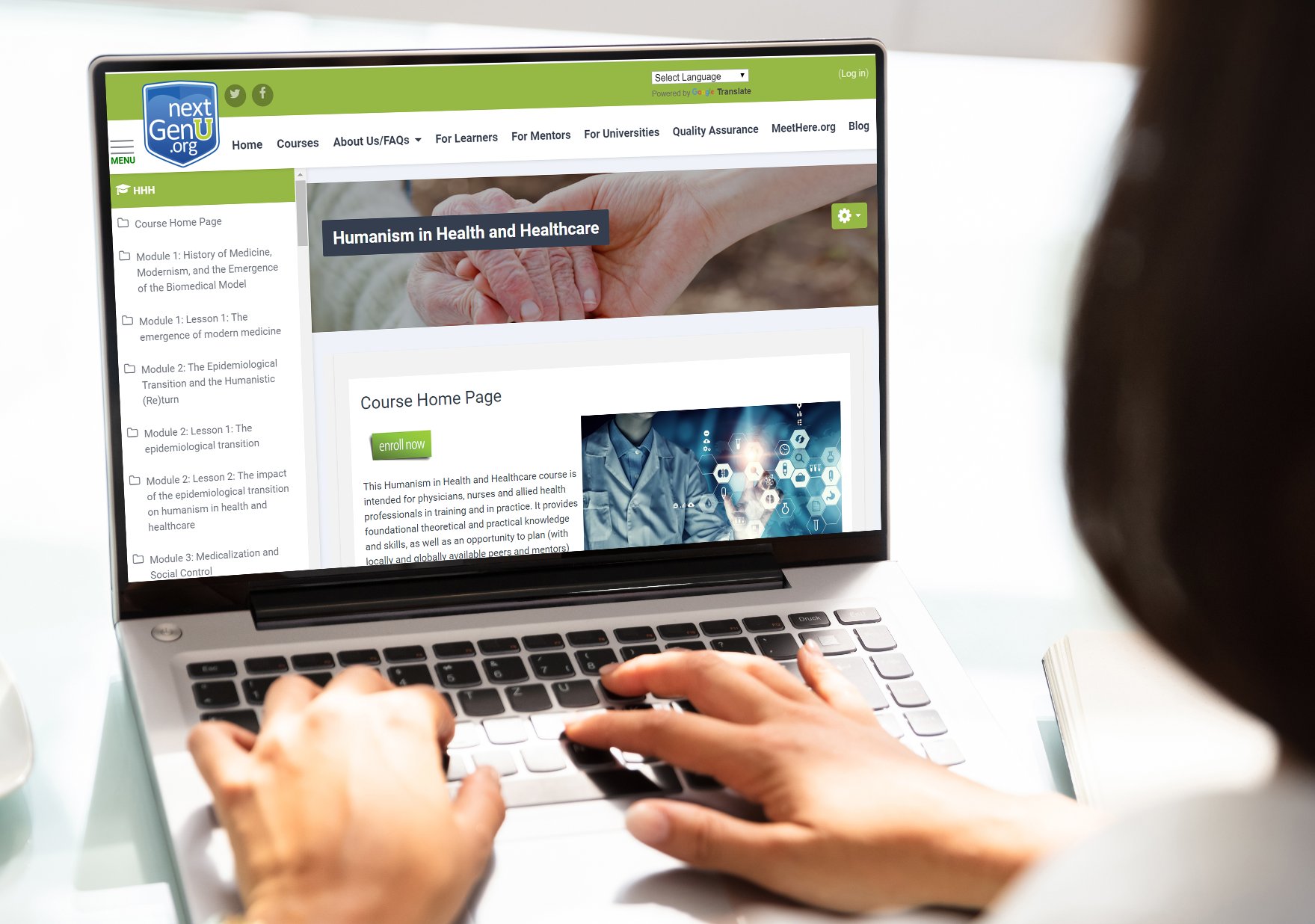
A new, free online-based course emphasizing humanism in health care studies — available to anyone globally — has been developed by Oakland University William Beaumont School of Medicine and Arnold P. Gold Foundation.
“Humanism in Health and Healthcare” has been in the works for more than year and recently launched via the NextGenU.org platform.
The hope is that those who provide care get a better understanding of humanism in the context of medicine, and that the content can be utilized by those who might otherwise have limited access to academic resources, according to one of the course co-creators from OUWB.
Since launch in April, more than 80 students from around the U.S. have participated in the course, including 20 who have completed it.
“It’s a real natural fit with OUWB’s mission and helps mark OUWB as a leader in this area nationally,” said Jason Wasserman, Ph.D., associate professor, Department of Foundational Medical Studies and Department of Pediatrics.
Wasserman co-created the course with Stephen Loftus, Ph.D., associate professor of Medical Education, Department of Foundational Medical Studies, along with two fourth-year medical students (M4s) — Inez Garzaniti and Nathan Loudon — and OUWB alum Matthew Drogowski, M.D.
Designed for physicians, nurses, and allied health professionals in training and in practice, “Humanism in Health and Healthcare” delivers an openly accessible, off-the-shelf set of resources.
It provides foundational theoretical and practical knowledge and skills, as well as an opportunity to practice humanistic techniques to assist patients in achieving positive health behavior changes.
Applicable to low-, mid- and high-income countries, participating students are invited to localize their experiences and, at the same time, invited to take multiple perspectives.
Humanism in medicine gaining importance
Being part of NextGenU.org provides easy access for those interested in the content. That’s because courses on the platform are open access, not behind any virtual firewalls, and don’t require an account or school subscription to a particular database.
Wasserman said the course is timely as humanism in medicine becomes increasingly important.
“Courses in humanism in medicine are still not well-integrated and developed within medical education,” he said. “Courses focused on bioethics have become more prevalent, but courses on the broader contours of humanism have lagged behind.”
It makes sense for OUWB to be involved because of the school’s emphasis on humanism in medicine, he said.
“Humanism is increasingly important in the context of humanism and health care,” Wasserman said. “Anywhere we can promote greater understanding of humanism and medicine is a good thing.”
That’s why Garzaniti — specializing in psychiatry and a recent match at University of Michigan, Ann Arbor — said she was interested in helping craft modules for the course as part of an independent study.
Garzaniti focused on health and health care for incarcerated populations as well as a module on poetry and its potential for use in self-reflection for medical professionals.
“When it comes to humanities, there is a lot of variation across medical schools in the way that those materials are emphasized,” she said. “I feel incredibly and deeply grateful that it is such an important part of the curriculum at OUWB.
“I’m also grateful that this will help to fill the need for students at other medical schools that don’t emphasize this curriculum as much as ours does,” said Garzaniti.
Dorothy Levine, M.D., vice president, Gold Humanism Honor Society, represented the Gold Foundation on the project.
According to its website, the Arnold P. Gold Foundation is a nonprofit that works with health care professionals to ensure that compassion, respect, and empathy are at the core of all health care interactions. It was established in 1988 by Arnold Gold, M.D. and Sandra Gold, Ed.D., their colleagues at the Columbia University College of Physicians & Surgeons in New York, and philanthropists.
In a press release from the Gold Foundation, Levine said she reached out to OUWB and was directed to Wasserman for help in crafting the curriculum.
“Wasserman’s expertise in clinical bioethics, sociology and experience in the education of medical students made him the perfect person to lead the design and development of this course,” said Levine.
Experts familiar with the course said it is particularly timely in light of the COVID-19 pandemic.
“We hope this new online course, created in partnership with our terrific partners at NextGenU.org and (Oakland University William Beaumont School of Medicine), will be helpful to medical and nursing schools in urgent need of curriculum that is easily accessible by students wherever they may be,” said Richard I. Levin, M.D., president and CEO, Gold Foundation. “Emphasis on humanism in healthcare studies is especially important right now, as this crisis tests our own humanity in complex ways.”
For more information, contact Andrew Dietderich, marketing writer, OUWB, at adietderich@oakland.edu.
Follow OUWB on Facebook, Twitter, and Instagram.
NOTICE: Except where otherwise noted, all articles are published under a Creative Commons Attribution 3.0 license. You are free to copy, distribute, adapt, transmit, or make commercial use of this work as long as you attribute Oakland University William Beaumont School of Medicine as the original creator and include a link to this article.

